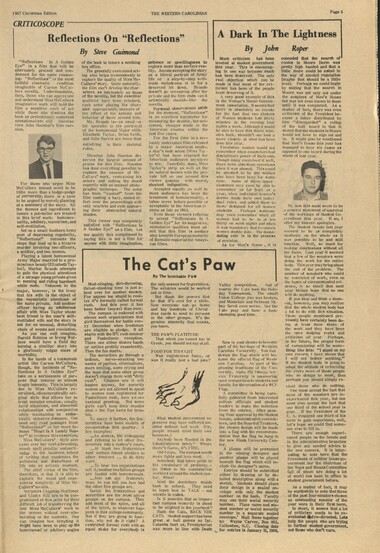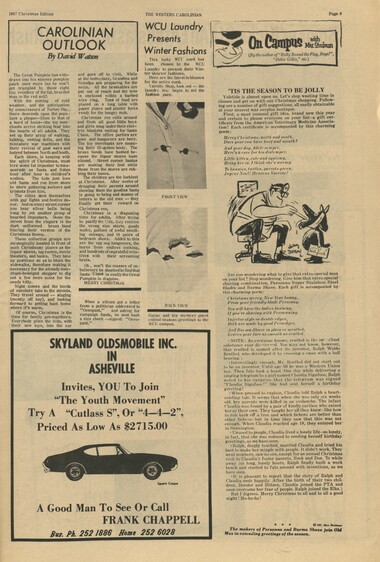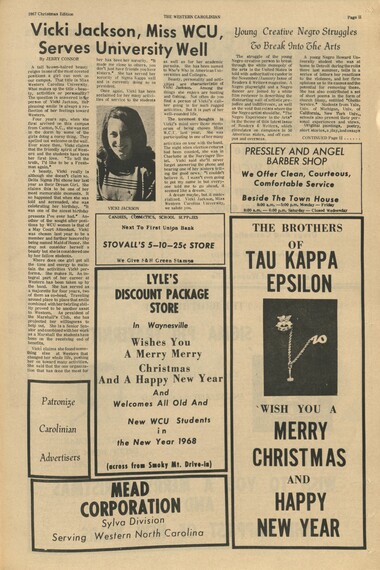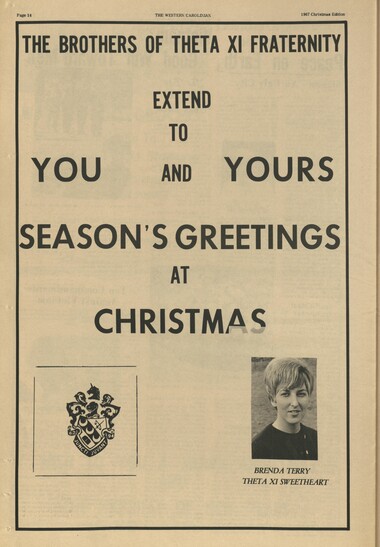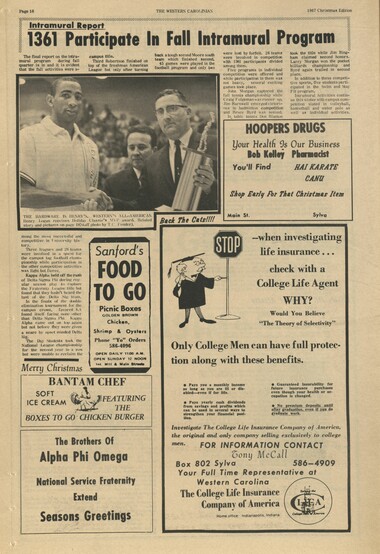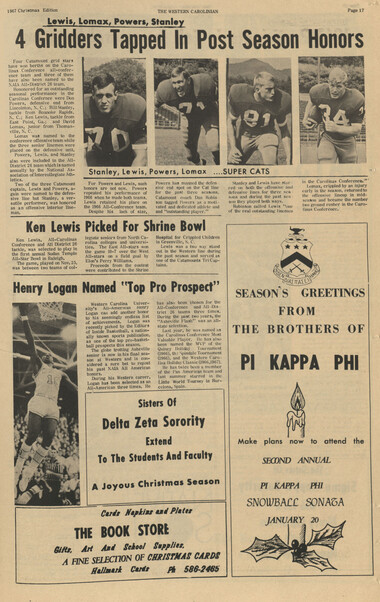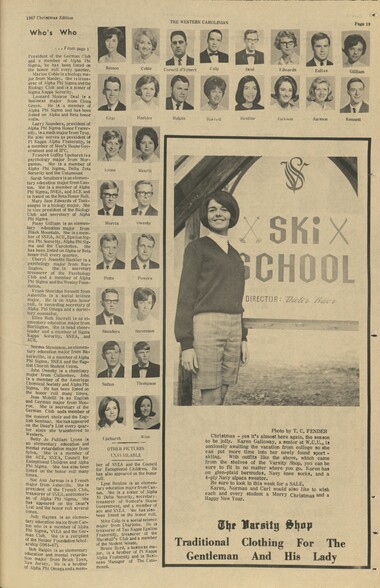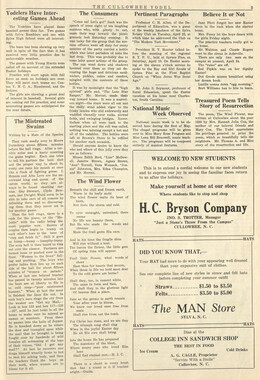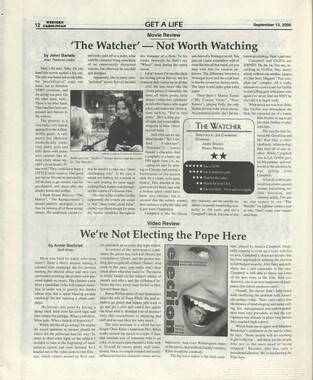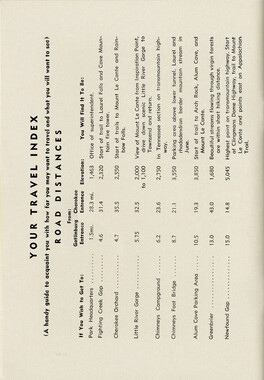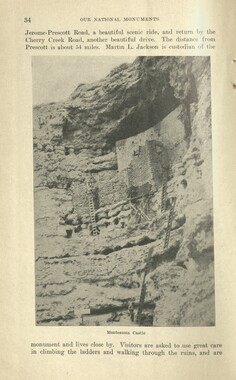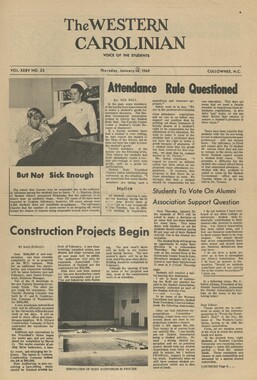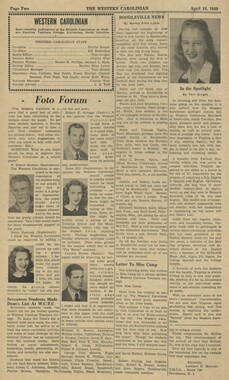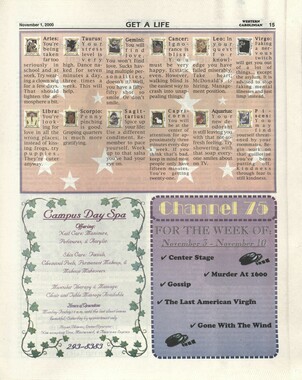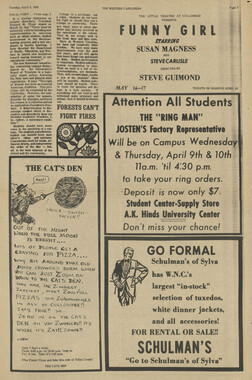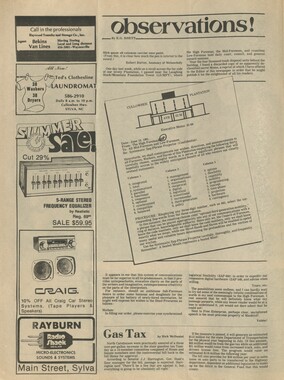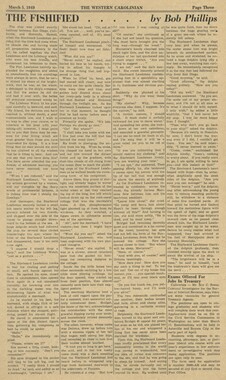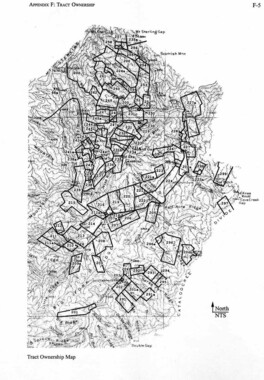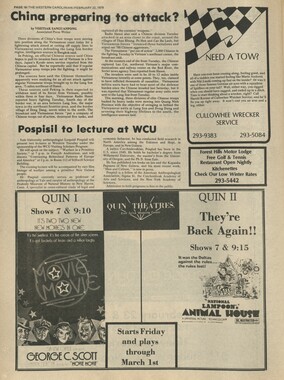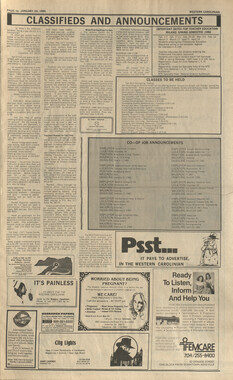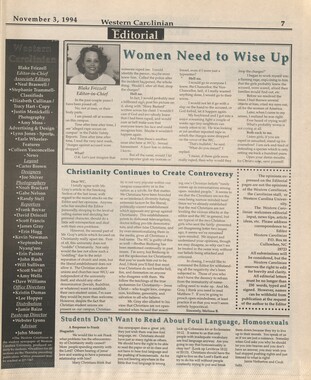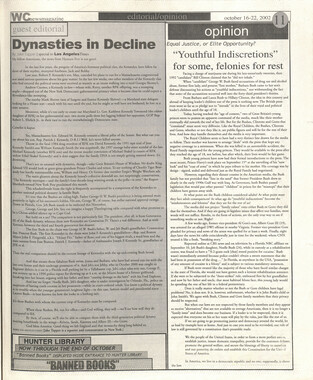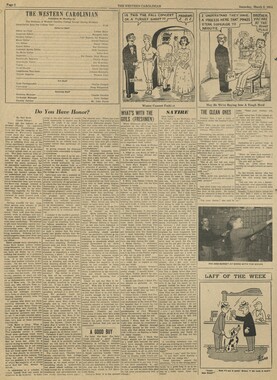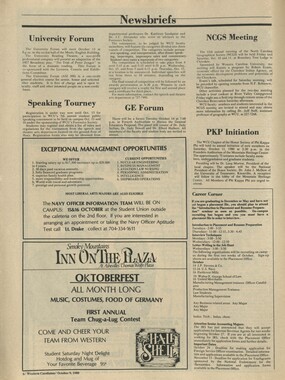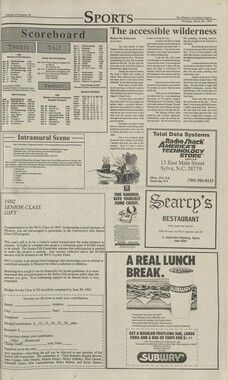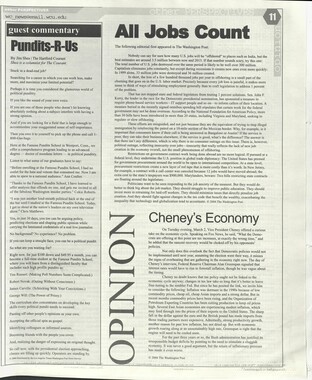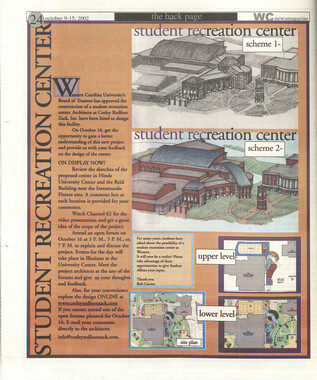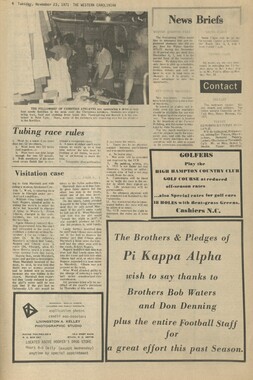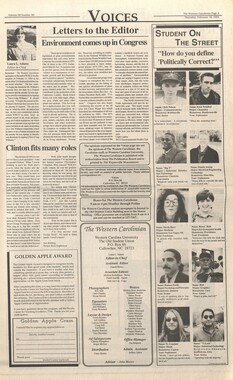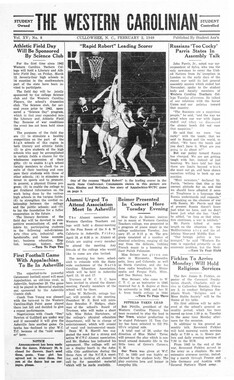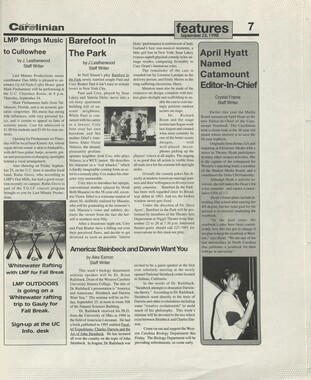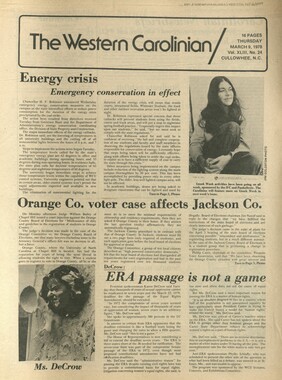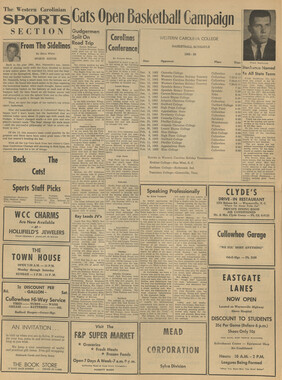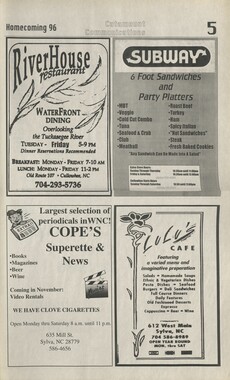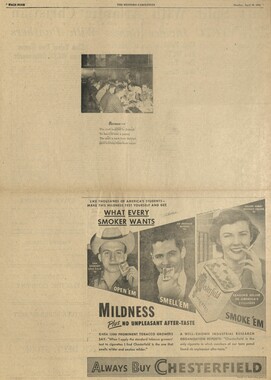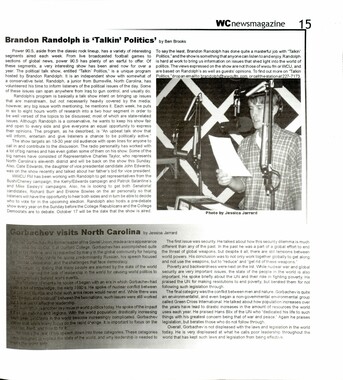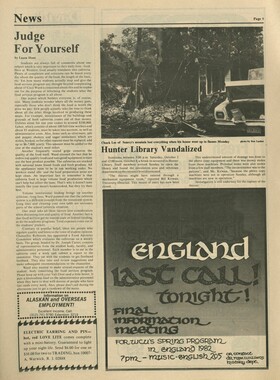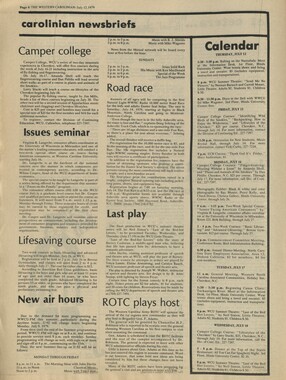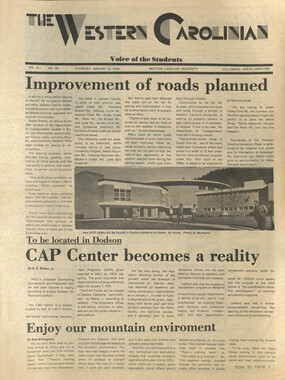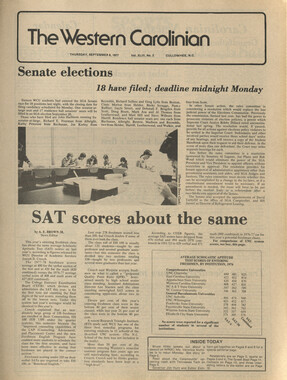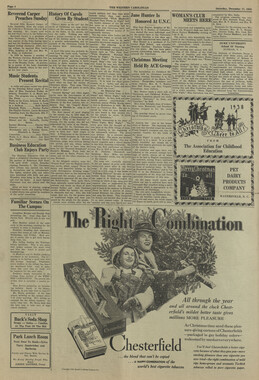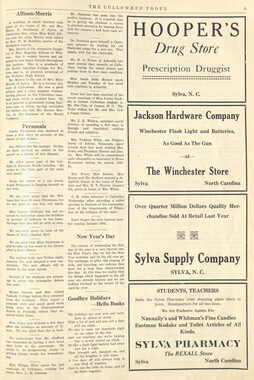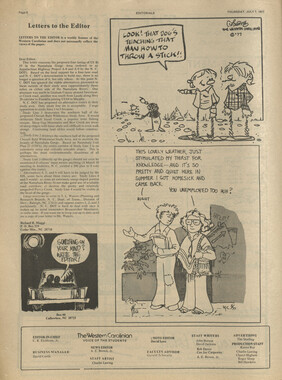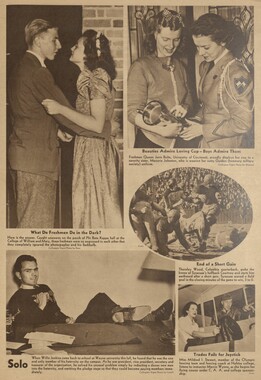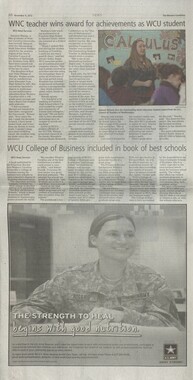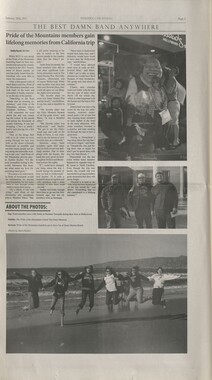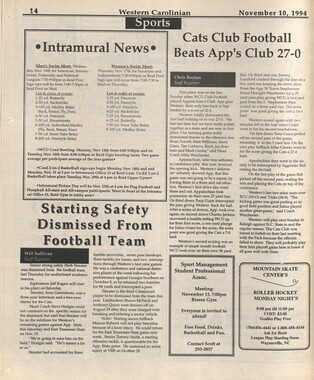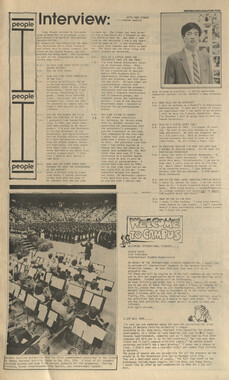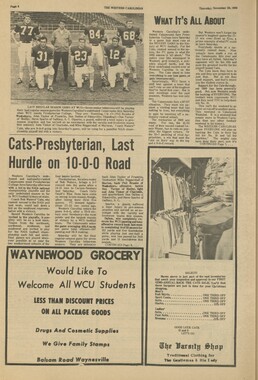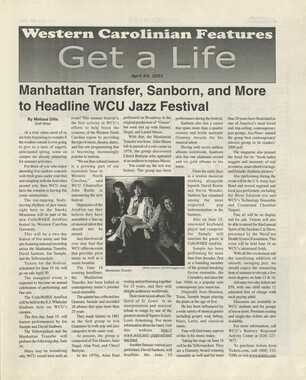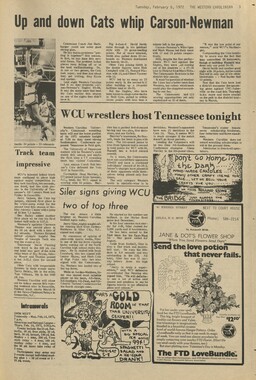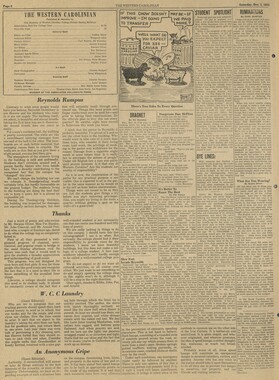Western Carolina University (21)
View all
- Canton Champion Fibre Company (2308)
- Cherokee Traditions (291)
- Civil War in Southern Appalachia (165)
- Craft Revival (1942)
- George Masa Collection (137)
- Great Smoky Mountains - A Park for America (3080)
- Highlights from Western Carolina University (422)
- Horace Kephart (973)
- Journeys Through Jackson (159)
- LGBTQIA+ Archive of Jackson County (89)
- Oral Histories of Western North Carolina (318)
- Picturing Appalachia (6617)
- Stories of Mountain Folk (413)
- Travel Western North Carolina (153)
- Western Carolina University Fine Art Museum Vitreograph Collection (129)
- Western Carolina University Herbarium (92)
- Western Carolina University: Making Memories (738)
- Western Carolina University Publications (2491)
- Western Carolina University Restricted Electronic Theses and Dissertations (146)
- Western North Carolina Regional Maps (71)
- World War II in Southern Appalachia (131)
University of North Carolina Asheville (6)
View all
- Allanstand Cottage Industries (62)
- Appalachian National Park Association (53)
- Bennett, Kelly, 1890-1974 (1463)
- Berry, Walter (76)
- Brasstown Carvers (40)
- Carver, George Washington, 1864?-1943 (26)
- Cathey, Joseph, 1803-1874 (1)
- Champion Fibre Company (233)
- Champion Paper and Fibre Company (297)
- Cherokee Indian Fair Association (16)
- Cherokee Language Program (22)
- Crowe, Amanda (40)
- Edmonston, Thomas Benton, 1842-1907 (7)
- Ensley, A. L. (Abraham Lincoln), 1865-1948 (275)
- Fromer, Irving Rhodes, 1913-1994 (70)
- George Butz (BFS 1907) (46)
- Goodrich, Frances Louisa (120)
- Grant, George Alexander, 1891-1964 (96)
- Heard, Marian Gladys (60)
- Kephart, Calvin, 1883-1969 (15)
- Kephart, Horace, 1862-1931 (313)
- Kephart, Laura, 1862-1954 (67)
- Laney, Gideon Thomas, 1889-1976 (439)
- Masa, George, 1881-1933 (61)
- McElhinney, William Julian, 1896-1953 (44)
- Niggli, Josephina, 1910-1983 (10)
- North Carolina Park Commission (105)
- Osborne, Kezia Stradley (9)
- Owens, Samuel Robert, 1918-1995 (11)
- Penland Weavers and Potters (36)
- Roberts, Vivienne (15)
- Roth, Albert, 1890-1974 (142)
- Schenck, Carl Alwin, 1868-1955 (1)
- Sherrill's Photography Studio (2565)
- Southern Highland Handicraft Guild (127)
- Southern Highlanders, Inc. (71)
- Stalcup, Jesse Bryson (46)
- Stearns, I. K. (213)
- Thompson, James Edward, 1880-1976 (226)
- United States. Indian Arts and Crafts Board (130)
- USFS (683)
- Vance, Zebulon Baird, 1830-1894 (1)
- Weaver, Zebulon, 1872-1948 (58)
- Western Carolina College (230)
- Western Carolina Teachers College (282)
- Western Carolina University (2008)
- Western Carolina University. Mountain Heritage Center (18)
- Whitman, Walt, 1819-1892 (10)
- Wilburn, Hiram Coleman, 1880-1967 (73)
- Williams, Isadora (3)
- Cain, Doreyl Ammons (0)
- Crittenden, Lorraine (0)
- Rhodes, Judy (0)
- Smith, Edward Clark (0)
- Appalachian Region, Southern (3032)
- Asheville (N.C.) (1945)
- Avery County (N.C.) (26)
- Blount County (Tenn.) (195)
- Buncombe County (N.C.) (1680)
- Cherokee County (N.C.) (283)
- Clay County (N.C.) (556)
- Graham County (N.C.) (238)
- Great Smoky Mountains National Park (N.C. and Tenn.) (525)
- Haywood County (N.C.) (3573)
- Henderson County (N.C.) (70)
- Jackson County (N.C.) (4925)
- Knox County (Tenn.) (35)
- Knoxville (Tenn.) (13)
- Lake Santeetlah (N.C.) (10)
- Macon County (N.C.) (421)
- Madison County (N.C.) (216)
- McDowell County (N.C.) (39)
- Mitchell County (N.C.) (135)
- Polk County (N.C.) (35)
- Qualla Boundary (982)
- Rutherford County (N.C.) (78)
- Swain County (N.C.) (2185)
- Transylvania County (N.C.) (270)
- Watauga County (N.C.) (12)
- Waynesville (N.C.) (86)
- Yancey County (N.C.) (72)
- Aerial Photographs (3)
- Aerial Views (60)
- Albums (books) (4)
- Articles (1)
- Artifacts (object Genre) (228)
- Bibliographies (1)
- Biography (general Genre) (2)
- Cards (information Artifacts) (38)
- Clippings (information Artifacts) (192)
- Copybooks (instructional Materials) (3)
- Crafts (art Genres) (622)
- Depictions (visual Works) (21)
- Design Drawings (1)
- Digital Moving Image Formats (2)
- Drawings (visual Works) (185)
- Envelopes (101)
- Exhibitions (events) (1)
- Facsimiles (reproductions) (1)
- Fiction (general Genre) (4)
- Financial Records (12)
- Fliers (printed Matter) (67)
- Glass Plate Negatives (381)
- Guidebooks (2)
- Internegatives (10)
- Interviews (823)
- Land Surveys (102)
- Letters (correspondence) (1045)
- Manuscripts (documents) (618)
- Maps (documents) (177)
- Memorandums (25)
- Minutes (administrative Records) (59)
- Negatives (photographs) (6090)
- Newsletters (1290)
- Newspapers (2)
- Notebooks (8)
- Occupation Currency (1)
- Paintings (visual Works) (1)
- Pen And Ink Drawings (1)
- Periodicals (194)
- Personal Narratives (10)
- Photographs (12977)
- Plans (maps) (1)
- Poetry (6)
- Portraits (4568)
- Postcards (329)
- Programs (documents) (181)
- Publications (documents) (2444)
- Questionnaires (65)
- Relief Prints (26)
- Sayings (literary Genre) (1)
- Scrapbooks (282)
- Sheet Music (2)
- Slides (photographs) (402)
- Songs (musical Compositions) (2)
- Sound Recordings (802)
- Specimens (92)
- Speeches (documents) (18)
- Tintypes (photographs) (8)
- Transcripts (329)
- Text Messages (0)
- A.L. Ensley Collection (275)
- Appalachian Industrial School Records (7)
- Appalachian National Park Association Records (336)
- Axley-Meroney Collection (2)
- Bayard Wootten Photograph Collection (20)
- Bethel Rural Community Organization Collection (7)
- Blumer Collection (5)
- C.W. Slagle Collection (20)
- Canton Area Historical Museum (2110)
- Carlos C. Campbell Collection (462)
- Cataloochee History Project (64)
- Cherokee Studies Collection (4)
- Daisy Dame Photograph Album (5)
- Daniel Boone VI Collection (1)
- Doris Ulmann Photograph Collection (112)
- Elizabeth H. Lasley Collection (1)
- Elizabeth Woolworth Szold Fleharty Collection (4)
- Frank Fry Collection (95)
- George Masa Collection (173)
- Gideon Laney Collection (452)
- Hazel Scarborough Collection (2)
- Hiram C. Wilburn Papers (28)
- Historic Photographs Collection (236)
- Horace Kephart Collection (861)
- Humbard Collection (33)
- Hunter and Weaver Families Collection (1)
- I. D. Blumenthal Collection (4)
- Isadora Williams Collection (4)
- Jesse Bryson Stalcup Collection (47)
- Jim Thompson Collection (224)
- John B. Battle Collection (7)
- John C. Campbell Folk School Records (80)
- John Parris Collection (6)
- Judaculla Rock project (2)
- Kelly Bennett Collection (1482)
- Love Family Papers (11)
- Major Wiley Parris Civil War Letters (3)
- Map Collection (12)
- McFee-Misemer Civil War Letters (34)
- Mountain Heritage Center Collection (4)
- Norburn - Robertson - Thomson Families Collection (44)
- Pauline Hood Collection (7)
- Pre-Guild Collection (2)
- Qualla Arts and Crafts Mutual Collection (12)
- R.A. Romanes Collection (681)
- Rosser H. Taylor Collection (1)
- Samuel Robert Owens Collection (94)
- Sara Madison Collection (144)
- Sherrill Studio Photo Collection (2558)
- Smoky Mountains Hiking Club Collection (616)
- Stories of Mountain Folk - Radio Programs (374)
- The Reporter, Western Carolina University (510)
- Venoy and Elizabeth Reed Collection (16)
- WCU Gender and Sexuality Oral History Project (36)
- WCU Mountain Heritage Center Oral Histories (25)
- WCU Oral History Collection - Mountain People, Mountain Lives (71)
- WCU Students Newspapers Collection (1923)
- Western North Carolina Tomorrow Black Oral History Project (69)
- William Williams Stringfield Collection (2)
- Zebulon Weaver Collection (109)
- African Americans (390)
- Appalachian Trail (35)
- Artisans (521)
- Cherokee art (84)
- Cherokee artists -- North Carolina (10)
- Cherokee language (21)
- Cherokee pottery (101)
- Cherokee women (208)
- Church buildings (190)
- Civilian Conservation Corps (U.S.) (111)
- College student newspapers and periodicals (2012)
- Dams (108)
- Dance (1023)
- Education (222)
- Floods (63)
- Folk music (1015)
- Forced removal, 1813-1903 (2)
- Forest conservation (220)
- Forests and forestry (1198)
- Gender nonconformity (4)
- Great Smoky Mountains National Park (N.C. and Tenn.) (181)
- Hunting (47)
- Landscape photography (25)
- Logging (122)
- Maps (83)
- Mines and mineral resources (9)
- North Carolina -- Maps (18)
- Paper industry (38)
- Postcards (255)
- Pottery (135)
- Railroad trains (72)
- Rural electrification -- North Carolina, Western (3)
- School integration -- Southern States (2)
- Segregation -- North Carolina, Western (5)
- Slavery (5)
- Sports (452)
- Storytelling (243)
- Waterfalls -- Great Smoky Mountains (N.C. and Tenn.) (66)
- Weaving -- Appalachian Region, Southern (280)
- Wood-carving -- Appalachian Region, Southern (328)
- World War, 1939-1945 (173)
Western Carolinian Volume 33 Number 18
Item
Item’s are ‘child’ level descriptions to ‘parent’ objects, (e.g. one page of a whole book).
-
-
1967 Christmas Edition Preamble THE WESTERN CAROLINIAN WESTERN CAROLINA UNIVERSITY STUDENT BILL OF RIGHTS Page 15 Free inquiry and free expression are essential attributes of Uie community of scholars. As members of that community, students should be encouraged to develop the capacity for critical judgement and to engage in a sustained and independent search for truth. The freedom to learn depends upon appropriate opportunities and conditions in Uie classroom, on the campus, and in the larger community, The responsibilitv to secure and to respect general conditions conducive to Uie freedom to learn is shared by all members of the academic community. Students should endeavor to exercise their freedom with maturity and responsibility. Article I. In the Classroom The professor in the classroom and in conference should encourage free discussion, inquiry, and expression. Students should be evaluated solely on Uie basis of their academic performance, not on their opinion s or conduct in matters unrelated to academic standards. Section A. Protection of Freedom of Expression. Students are responsible for learning thoroughly the content of any course of study, but they should be free to take reasoned exception to the data or views offered and to reserve judgement about matters of opinion. Section B. Protection Against Improper Disclosure, Information about student views, beliefs, and political associations which professors acquire in the course of their work as instructors, advisers, and counselors should be considered confidential. Protection against improper disclosure is a serious professional obligation. Judgments of ability and character may be provided under appropriate circumstances. Section C. Protection Against Improper Academic Evaluation. Students are responsible for maintaining standards of academic performance established by their professors, but they should have protection through orderly procedures against prejudicedor capricious academic evaluation Article II. Student Records Institutions should have a carefully considered policy as to the information which should be part of a student's permanent educational record and as to the conditions of its disclosure. To minimize the risk of improper disclosure, academic and disciplinary records should be separate, and the conditions of access to each should be set forth in an explicit policy statement. Transcripts of academic records should contain only information about academic status. Data from disciplinary and counseling files should not be available to unauthorized persons on campus or to any person off campus except for the most compelling reasons. No records should be kept which reflect the political activities or beliefs of students, exclusive of voluntary indication of membership in church and political clubs or organizations. Administrative staff and student personnel officers should respect confidential information about students which they acquire in Uie course of their work. Article III. Student A/Iairs In Student Affairs, certain standards must be maintained if the academic freedom of students is to be preserved. Section A. Freedom from Arbitrary Discrimination and Association. College facilities and services should be open to all students, and institutions should use their influence to secure equal access for all students to public facilities in the local community, 1. Each organization should be free to choose its own campus advisor, subject to approval by the Policies Committee. Members of the faculty serve the college community- when they accept th e responsibility to advise and consult with student organizations; they should" not have the authority to control the policy of such organizations except where the advisor has to act in accordance with college policies. 2. Student organizations may be required to submit a current list of officers, but they should not be required to submit a mem bership list as a condition of institutional recognition, 3. Students and student organizations should be free to examine and to express opinions publicly or privately. They should also be free to support causes by any orderly means which do not disrupt the regular and essential operation of the institution, 4. Students should be allowed to invite and to hear any person of their choosing, subject to limitations by statutes of North Carolina law. While the orderly scheduling of facilities may require the observance of routine procedures before a guest speaker is invited to appear on campus, institutional control of campus facilities should never be used as a device of censorship It should be made clear to the academic and larger community that sponsor ship of guest speakers does not necessarily imply approva endorsement of the views expressed, either by group or the institution. ' Student Participation in Instttionai Gwtrtmnfc A»™*j|" uents of the academic community, students should * £f' ,n£. vidualh and collectively, to express their ;'e"s 'n '^ Xt titutional policy and on matters of general interest tajhc «uocm or sponsoring titutional policy aim mi ...»..-■ - — ~ a,.finnd means to oar- bodv. The student body should have c early ^'"^^'Xc^nB tic i -ate in the formulation and apphcation of regulating ai.ee ^ student affairs. Student governments should be protected arbitrary intervention. ^todent Publications. Student publication*i and *c student^rcss are a valuable aid in establishing and maintaining an atmospfteri of free and response ^^5^^ to £ SS o/r facV SZ ££L au^.and of formulating student opinion on various issues on the campus and in the world at large. f censorship and advance ^■2*0^.^"^^ia\r%.SnSand n'ews coverage shouJcIt freely developed by the editors and managers. 2, Editors and managers should subscribe to canons of responsible journalism, At Uie same time, they should be protected from arbitrary suspension and removal because of editorial policy or content, Only for proper and stated causes should editors and managers be subject to removal and then by orderly and prescribed procedures Article IV. 0/1-Campus freedom of Students Section A. Exercise of Citizenship . As citizens, students should enjoy the same freedom of speech, peaceful assembly, and right of petition Uiat oUier citizens enjoy. Faculty members and administrative officials should insure that institutional powers are not employed to inhibit such intellectual and personal development of students as is often promoted by their off campus activities and Uieir exercise of Uie rights of citizenship. Section B Institutional Authority and Civil Penalties, Activities of students may upon occasion result in violation of law. In such cases, institutional officials should apprise students of their legal rights and may offer other assistance. Institutional authority should never be used merely to duplicate the function of general laws. Only where the interest of the institution as an academic community are distinct from Uiose of the general community should Uie special authority of the institution be asserted. The student who incidentally violates institutional regulations in Uie course of his off campus activity, should be subject to no greater penalty than would normals}' be Imposed if the same incident occurred on campus. Institutional action should not be solely dominated by community pressure. Article V. Section A. Procedural Standards in Disciplinary Proceedings Notice of Standards of Conduct l\pocted of Students, Disciplinary proceedings should be instituted only for violation of standards of conduct defined in advance and published through such means as a student handbook or in a generally available body of college regulations. Offenses defined in the vague phrases as "undesirable conduct" or 'conduct injurious to the best interest of the ins'tution* should he clearer and vested to state "students who exhibit io such a poor magnitude of conduct which reflects a negative impression up n Hit: college, place themselves in a position which is subject to some degree of disciplinary action.* Section B. Investigation of Student Conduct, 1, Except under emergency circumstances, premises occupied by students and the personal |>ossessioiis of students should not be searched unless appropriate authorization has been obtained. For premises such as dormitories controlled by the institution, an appropriate and responsible authority should be designated to whom application should be made before .search is conducted. The application should specify the reason for Uie search and the objects or information sought The student should be present, if at all poS.'ible, and also the official calling for the search be present in the room at Hie time of the search. 2. Students delected or ■•rested in the course of serious viola tion of institutional r< ;..i.iik.-:is, or infractions of ordinary law should be informed of the' ,:,iits. No form of harassment should be used In institutional r . escntatives to coerce admissions of guilt or information nlv".;; conduct of other sus|K'cted persons, Section C. Status of Student Pending Final Action. Pending action on the charges, the status of a student should not be altered, or his right to be present on the campus and to attend classes suspended, except for reasons relating to his physical or emotional safety and well being, or for reasons relating to the safety of students, faculty, or college property. Section D. Hearing Committee Procedures. The formality of the procedure to which a student is entitled in disciplinary cases should be proportionate to the gravity of the offense and the sanctions which may be imixised. Minor penalties may be assessed informally under prescribed procedures. When misconduct may result in serious penalties, Uie student should have the right to a hearing before a regularly consituted hearing committee. 1. The hearing committee should include faculty members and student members. No members of the hearing committee who are otherwise interested in the particular case should sit in judgment during the proceding, 2. The student should be informed in writing, of the reason for Uie proposed disciplinary action with sufficient particularity, and in sufficient time, to ensure opportunity to prepare for Uie hearing. '.i. The student appearing before the hearing committee should have the right to be assisted in his defense by an advisor of his choice, 4. The burden of proof should rest upon the officials bringing the charge. 5. The student should be given an opportunity to testify and to present evidence and witnesses. He should have an opportunity to hear and question adverse witnesses. In no case should the committee consider statements against him unless he is advised of their content and of the name of Uiose who made them, a-id unless he is g!va-i an opportunity to rebut unfavorable inferences which might otherwise be dra*a. 6. All matters upon which the decision may be based must be introduced into evidence at Uie proceding before the hearing committee The icemen should be based solely upon such matter. Improperly acquired evidence should not be admitted. 7. In the absence of a transcript, there should be both a digest and a verbatim record, suc'i 13 a tape recording, of the hearing. 8. The decision of the hearing committee should be final, subject to the student's right of appeal to the governing board of the institution.
Object
Object’s are ‘parent’ level descriptions to ‘children’ items, (e.g. a book with pages).
-
The Western Carolinian is Western Carolina University’s student-run newspaper. The paper was published as the Cullowhee Yodel from 1924 to 1931 before changing its name to The Western Carolinian in 1933.
-






